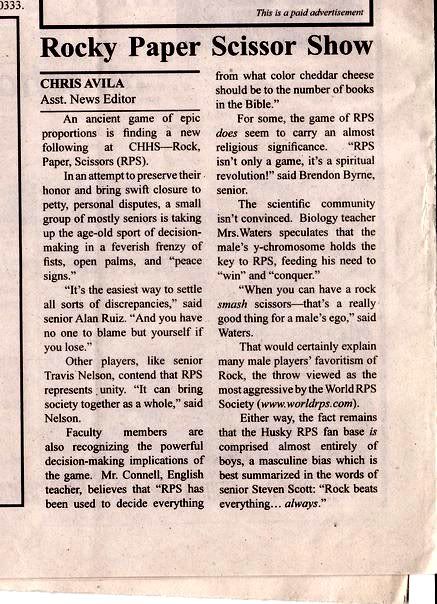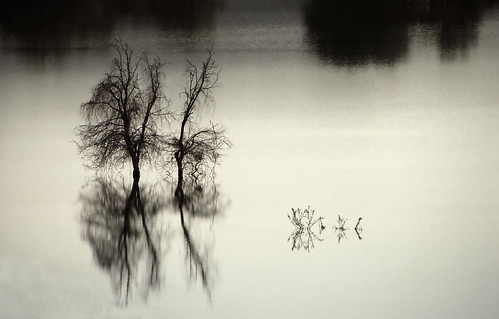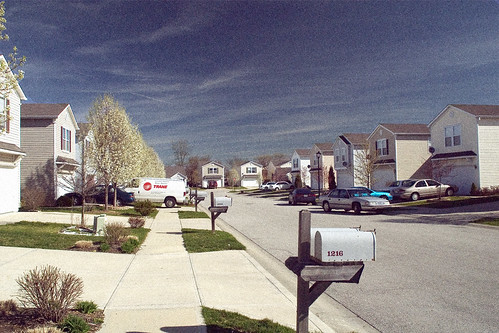Twelve years old and the picture is as perfect as the day it was taken; despite the conspicuous coffee stains, smudgy ink, and the deteriorating corners, the Polaroid

print inhabiting my side table drawer waited for twelve years. As the digital alarm clock, playing centerpiece to my wooden side table, counted the hours, as the moon and sun continuously fluxed roles, as I learned math, writing, and how to read, the photograph lay waiting until this very day. I grasp the brass drawer handle amid my fingers; the mahogany drawer creaks as it struggles through the rusting under track and–as though opening a window to show a forgotten autumn view–I see my young self: embraced by a tiny young girl.
* * *
It awed me to watch the green chlorophyll-pigment escape a divine leaf; It awed me more to witness the yellowish-red autumn take over. My mother’s freshly manicured nails gently nicked me as she held my five-year-old fingers. We walked on the familiar suburban road on our way to my old day care where, the day previous, I had misbehaved. In my left hand, I held an autumn leaf–examining the changes that had been taking place. To my right, a slight timbre in my mother’s walk instructed me to stay silent–to not rattle a cage. People back then had the unanimous description of me as:
“Wild and uncontrollable!” shouted my pre-school teacher: a women, I no longer know the name of. My mother and I took a seat, resting upon the surface of the plastic glossy-red chairs: uncomfortable and–to a child–indestructible.
“We try controlling him,” my mother defended, with her infamous passive-aggressive tone, “but he’s just so… so…”
“Attention deficient?” she stated with a proclivity for suggestion.
“No. My boy doesn’t have a disorder. He’s just--.”
“Mildly energetic? Hyperactive? Prone to tantrums?” my teacher’s inclinations were nothing short of subtle, of course.
“His father likes to call it creativity,” my mother begun to rise from the seat, heading towards the door; she takes me by the hand again, “Why isn’t he off the walls now, huh?”
“He’s obviously scared he’s in trouble, right little Matty?” she shifted her tone at the end, attempting to appeal to my childish behavior–I knew better; I remained mute, “your boy hasn’t done a single cooperative or productive thing all year. He constantly picks on his classmates and throws toys around for fun. He never sleeps during nap time, he never stops talking, he never tries to stay on task! Tell me, do you see him show any signs of attention or focus at home?”
My mother hesitates, scavenging for a previous demonstration of academic trait, “Yes.”
“When?” my teacher retorted, snootily.
“When he’s with our next door neighbor’s daughter, that’s when,” she succumbed to the excitement of discovering my niche, “he tells her stories about adventures and shows all the time. They make up games together and they’re just the two most creative kids I’ve ever met!”
* * *
Nostalgia evokes my mind as I stare into Natalie’s young brown eyes in the photo. I remember–as I see–the prepossessing curly brown hair of my first little audience member. Her widely eclectic lips would smile; they would depress the dimples that symmetrically sunk beneath her tiny tannish cheeks as she applauded for me–all captured in frozen image.
I abort my evocative stream of conscious memories–focusing now on the task at hand. Around my neck, a Polaroid–I own in antiquity–hangs by a black strap, laying gently on my chest as I sit on my bed. Reaching into my jean pocket, I unfold a flier. It informs about a photography contest being held; winners earn a free vacation anywhere in the United States. Theme: innocence.
The photograph I hold is gorgeous. Lighting: spot on–the color of the autumn trees in the background compliment our eyes. Her arms bide me from behind. A perfect snapshot–yet unqualified; the contest is strict. No coffee stains allowed.
* * *
“What did she say?” Natalie asked, referring to my teacher.
We were both located in her backyard: plastic balls, hula-hoops,UPS packaging boxes, and technicolor chalk–scattered through the 20-acre wonderland. Goldenrod rays flooded the land–along with my yard, right next door–and everything glowed mystically. The sun, right above, sent the illusion of golden highlights falling, spiraling, as she moved, through her beautiful curly hair.
“Well…” I stretched the “L” sound; like lightning, I started zipping through my young thoughts, scavenging for something to amuse her, “she said I was a genius, and should move to genius school!”
“No way!” her eyes beamed with the goldenrod light that shined down on her; she didn’t want to believe it, but in earlier minds our imaginations manifest reality.
“Yeah way!” I looked straight into her eyes–to ignite belief, “and I can prove it, too!”
Her smile divulged her dimples; she clenched her teeth as she giggled, “Nuh uh.”
“Ya huh, ask me a question!”
“What kinda question?”
“Umm,” I think like a genius, “ a’ ar’thimetic one! Math!”
“Hmm, okay,” she pondered for a moment and her eyes gleamed again, “what’s a bajillion times five-million bajillion?”
“Easy,” with narcissistic lingo, to trick her, “two-million quadrillion,” I pause for dramatic effect, to prolong applause, to accumulate anticipation, “and one.”
She giggles hysterically at the punch line; I looked into her eyes and her face scrunched up as she smiled–for odd reasons, I smiled back.
“My teacher also said something else,” although two young to acknowledge–my heart began racing, multiplying two-million quadrillion and one times faster.
“Oh yeah?” she smiled again, prepared for another set-up; the gold glares in her hair undulated like a contained jello, “What else?”
“She said I’m quite the smoocher,” I tried to keep an earnest face, any sign of a humorous emotion–God forbid a blush–could jeopardize my entire devious ruse.
“What?!” she was in sheer shock and her jaw dropped like a cartoon, “how would she know?!”
Improvising again, “We were doing a kissing project,” a trait I still carry to this day: compulsive lying, “we had to kiss apples and pears and I did the best.”
“Oh my gosh,” she giggled again, hysterically, “that’s unbelievable.”
“Believe it,” I said, solemnly.
A lull–then, “I never kissed anyone before.”
“Me neither,” I stated.
At five years, a child can’t decipher an intimate moment from anything else in the world, but the biology usually stays the same. My veins constricted, blood rushed faster. I scanned for any parental unit within view. I take a step closer to her; my foot barely missing a mature dandelion grown atop the green grass. Beneath our slowly attracting feet, another action occured; a tiny yellow bee–leftover from the summer–began to nestle onto the delicate weed. The insect hovered, dropping altitude, closer and closer to the dandelion; I remember her dimpled cheeks getting closer and closer to mine.
* * *
Who cares–I think to myself–what do five-year olds know about that stuff anyway? The sole of my shoes slide as I walk on freshly dewed grass. It smells of natural oak and wood, a wet freshness and a cool chill, stimulating my nostrils, fashioning appreciation for the tranquility of far-western suburbia. I crouch lowly; Polaroid pointing to a dandelion diverging a trail of black ants into two paths, amongst the green.
The camera begins humming, configuring, manufacturing the snapshot. Through the Polaroid outlet slot, an image ejects–printed upon a gloss coated sheet. I redeem the photograph from my hanging camera; the image taken is horrendous: too saturated, stray winds catching blades of grass producing negative and unbalanced effects.
It was cold. My fingers ached. It became hard to simply take a picture. The damp grass sloshes as I travel across the green-belt. All my life I’ve traveled across suburbs; These minuscule societies built on bricks of prosperity, progression, and the perfect industrial family–yet why couldn’t I capture innocence?
Rusted chain creaks accompany the sound of an accelerating wind, as a swing set imitates a descending pendulum. Beneath my chilled toes, the sound of moist grass resides for the audibility of crunching wood chips. Through the lens, I see a lonely park; Gray clouds begin to accumulate in the sky and a bead of fallen rain hits the camera. I drop the Polaroid–allowing the neck strap to catch it.
* * *
We were transfixed on a Pavlovian response, averted to the trill of a wasp’s flight; Immediately, Natalie and I relinquished our two plastic swings, fleeing from the winged insect. Refuge was made at her house. We sat on a leather couch, in her basement, we drank the traditional elementary fruit punch, and we viewed sitcoms from the biggest television I had ever seen (back then, of course).
As the dim fluorescent television glow brightened her face, she told me about her worries. She feared starting elementary school, not making any friends, or getting bullied; Our personalities were complete opposites. I laughed at her phobias and assured her they were nothing. She believe me and we watched a cartoon–filling the commercials with our own laughter.
* * *
The swift rudiments the rain played grew harsher as I ventured my neighborhood–now aimlessly taking pictures of anything. Lightning discharging, rumbling skies, and rain only buried my determination to find innocence in this scenery; I press “click” and the Polaroid ejects a decaying cactus and to my surprise, I manage to capture lightning. I laugh at my displaced luck.
* * *
An violent orange warmth illumined our neighborhood, the mild brightness decorated even the darkest of places, giving my formal pre-school a soothing autumn glow, giving our houses a scenic spotlight. The orange-red could be found anywhere: bouncing off the sidewalk asphalt, disjoining at a tree, spiraling down her curls.
As a decade old male, lifting cardboard boxes filled with household utilities came easy; the same could not be said for Natalie: a nine year old female. I loaded, going back and forth between front porch, sidewalk, then U-Haul, Natalie helped me. In frustration she said, “Matty, you dork, help me with this box!”
Annoyed, I laid my box down on the concrete sidewalk. Catching a glimpse of the label on her box, I grew

irritated. “Tupperware…” I paused for dramatic effect, “You need help carrying tupperware, really?”
“Oh, don’t talk high and mighty with me, mister I-can-never-play-cause-I’m-exhausted!” she retorted.
I couldn’t wait until every material possession I owned was in that U-Haul. My family and I were leaving this small suburban home for a bigger one, closer to the city, with more room. I didn’t want to leave Natalie forever–just a break. It was agreed that monthly visits would be made.
The afternoon continued similar to this: She whined; I whined. Gradually, the boxes stacked atop each other within the storage, building piles, and as the orange sunset descended beneath the horizon, my father closed the U-Haul, ready to leave, but not completely. My mother and father already gave their goodbyes to Natalie’s parents; they were in the van. I approached the family automobile and got in.
“Hey Matt,” my father said from the driver seat, “I’d say bye to Natalie if I were you.”
Deciding to obey, I exited the car, and climbed up her front porch steps to press the doorbell. Seconds after the gentle tune filled her house, the door opened and the dim glow of the autumn sunset was enough to see her face; It looked as though she was crying.
“Bye,” I said, generically.
“Bye,” her voice cracked slightly.
I was speechless; I wanted to leave, so I began to turn, but her hand clenched my shoulder. She turned me around and embraced me. The sunset finally gave way to moonlight–and it was silent.
“I’ll visit you every month,” she promised.
* * *
I got home. I’m sitting at my desk; I’m holding Polaroids in my hands by the hundreds. I stare into the highly saturated, horribly lit, and unimpressive photograph cocktail. They all suck. Submitting the picture of the thunder by the cactus crosses my mind. Could be good, in an abstract contemporary way.
* * *
The whistling had to stop. It had been a good year since I’ve moved farther from Natalie, she was still visiting me, barely. I stared at my homework assignment–that God forsaken teapot blower wouldn’t shut up; the numbers in my math problems begun to mix into each other, and anxiety irked my mind until I finally snapped my number two pencil and exited my room.
She was playing with my little sister in the room next to mine; Our new house was a lot more spacious, but sound seemed to reach me faster. I opened the white dry-wall door, two girls were dancing and whistling to the tune of a song I don’t remember.
“Natalie!” I half-shouted.
She stopped the noise and dance, my sister followed. Turning, she looked at me and half-shot me a smile, “What’s wrong?”
“Uh…” I attempted to sound nicer, “I have to do homework. Can you guys be quiet,” a hesitation, “please?”
“Oh,” she sounded taken aback, “alright.”
The next two hours I did my work in silence, the occasional laughter here and there; I tolerated. After work was finished, my phone rings: a girl from my middle school. At age 11, you’re all too aware of an intimate opportunity.
I could still hear the other two in my sisters room at nighttime. It was cold. My fingers felt numb as I held the phone: talking to a girl I don’t remember, wishing it was still daytime. Fourteen minutes invested into the phone, I heard a gentle thud on my door. Suspicion alerted me, Natalie is up to something.
With the simple, “Hey can I call you back?” I paused the conversation. Suddenly, the door flung open before I got to the handle, hitting me on the forehead. Natalie entered my room laughing, oblivious to my injury.
“Hey Matty!” she yelled obnoxiously; I grew frustrated. How dare she made me hold a call, “Who was the girl you were talking to? Your new lover?”
It was a mixture of pain, intolerance, and catalytic brewing of the hormones.
“Your voice rattles when you talk to her!” she laughed.
It was a mixture of accumulating annoyance, anger, pain.
“You even try to make little cutesy phrases,” she went nuts.
It was a highly saturated, horribly lit, and unimpressive cocktail.
“Shut up!” I broke, “Shut the hell up, okay?”
She’s silent.
“You annoy me! You’ve gotten on my nerves since the day I met you! You dumb little cooz!” the biology stays the same for teenagers too: adrenaline.
She’s silent.
“You’ve gotten on my nerves since grade school when we walked home… and it just keeps getting worst!”
She cried.
“I hate you! Get out of my life! I want nothing to do with you!”
* * *
That was the last time I saw Natalie, running out of my room in tears.
All these photos suck.
* * *
I laid down in my bed, staring out of my window, gazing at the cobweb of stars weaved into a midnight sky. Stillness filled the air. Unexpectedly, my cell phone began to ring and I scurry out of bed to search; The ringing was faint, barely audible. It was probably under the covers or one of my other pillows, perhaps the closet.
The ring ceased and silence returned to my room. There I stood, aimlessly scanning for the handheld. Suddenly, another ring intruded: quieter, quicker.
Voicemail received.
Minutes later I found it beneath the mattress, and I played the message: Hi Matty, this is Natalie. Uh… I just called to say happy birthday. I didn’t forget it was today… twelve years old. Congratulations buddy… I really miss you. A lot. And I miss being around you. And I want to hear from you. And… and… I love you and just wanted to say ‘hi.’ Bye Matty… call me back as soon as you can.
* * *
I’m sixteen now. There was no call-back. No reply–just silence. I live farther now, too.
Currently I hold a manilla folder from Flickr Inc.; I tear it apart. I unfold the letter. I read: “We regret to inform you that your photograph is unqualified for judging due to coffee stains.”
* * *
“Alright Matty and Natalie, ready?” her mother said.
The goldenrod, filtered by the autumn leaves branching from the oaks, grazed our heads as Natalie and I adjusted ourselves in front of the Polaroid.
“This is the coolest gift ever!” I stated, referring to the camera.
“You’re welcome, sweetheart. Now stay still so I can get you two in this picture correctly.” We waited for another minute; Natalie’s mother struggled to turn off the flash.
Behind us, our suburbia was enriched by autumn leaves drizzling with the light wind. The golden grasses of our front lawns complimented the autumn-leaf showers. A cricket nearby played a tune–a tune I no longer remember, only that it was joyous. The smiles we formed just laughing about stupid 5-year-old stuff.
“Okay ready?”
We prepared our pose: magazine smiles and silly eyes.
“One.”
“Two.”
“Say cheese… and…”
I felt Natalie’s arms suddenly flung onto my biceps, embracing me from behind and to a complete shock my magazine smiles turned genuine.
We heard clicks; We heard noise.
And a picture perfect photograph was ejected.
 “Are you sure you want to do this?” Alsenoth was trying to convince Kala otherwise.
“Are you sure you want to do this?” Alsenoth was trying to convince Kala otherwise.













